Fiction
Fiction
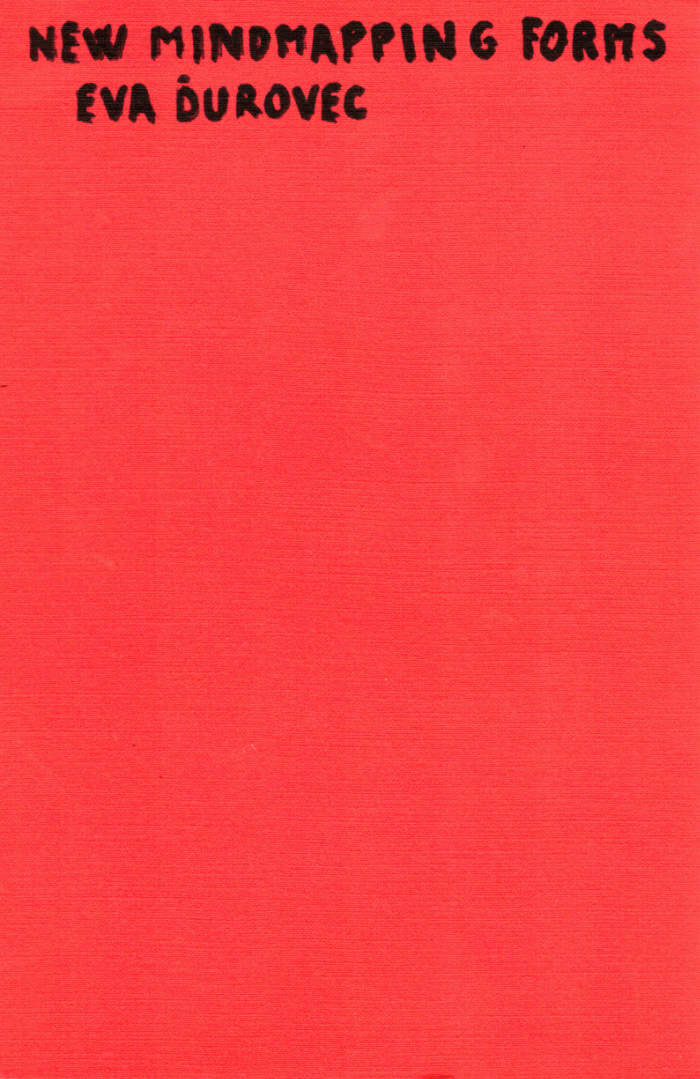
New Mind Mapping Forms
There is a story about a meatball which comes out of nowhere, hitting some people's heads and changing their lives forever. There is a mouse that gets caught while trying to find a cheesy snack. There has been a 100% increase in the cost of rent in Berlin in the past 10 years and no increase in my wages. A bag full of basmati rice. A teacher stuck at work waiting for students stuck at work. There is the price one pays to purchase organic underwear so that their intimate parts are not stifled from nine hours in the office chair. There are 10 missed calls from my mother. There are places to which one cannot return and cities where it is impossible to live. There are fertility treatments that send fish oil straight into the veins two days before and two days after ovulation. The feeling of a needle in the middle of the uterus, which could be due to pregnancy, or due to fear. There is a Master's thesis which is no Master's thesis. There is a book that was not intended to be published, that was not intended to be read.
Eva Ďurovec works as a software tester 40 hours per week and studies art at the same time. There are not enough hours in the day to complete everything, to comply with everything. And then there is also her desire to have children. The question: how can all of this be reconciled within the profession of artist? Ďurovec investigates the possibilities that arise from different class formats, and asks what we produce and reproduce—with our bodies, through our routines, trapped between the recurring desires and cruelties of daily life.
Eva Ďurovec (*1981 in Snina, former Czechoslovakia) studied Spatial Strategies at Kunsthochschule Berlin-Weiensee. Her work deals with living-space and life-fulfillment in the context of social, economic, and environmental crises, and with issues of corporate power and kleptocracy.

From the Depths: And Other Strange Tales of the Sea
From atop the choppy waves to the choking darkness of the abyss, the seas are full of mystery and rife with tales of inexplicable events and encounters with the unknown.
In this anthology we see a thrilling spread of narratives: sailors are pitched against a nightmare from the depth, invisible to the naked eye; a German U-boat commander is tormented by an impossible transmission via Morse Code; a ship ensnares itself in the kelp of the Sargasso Sea and dooms a crew of mutineers, seemingly out of revenge for her lost captain.
The supernatural is set alongside the grim affairs of sailors scorned in these salt-soaked tales, recovered from obscurity for the 21st century.
Table of Contents:
From the Depths - F. Britten Austin
The Ship of Silence - Albert R. Wetjen
From the Darkness and the Depths - Morgan Robertson
Sargasso - Ward Muir
Held by the Sargasso Sea - Frank H. Shaw
The Floating Forest - Herman Scheffauer
Tracked: A Mystery of the Sea - C. N. Barham
The Mystery of the Water-Logged Ship - William Hope Hodgson
The Murdered Ships - James Francis Dwyer
The Ship that Died - John Gilbert
Devereux's Last Smoke - Izola Forrester
The Black Bell Buoy - Rupert Chesterton
The High Seas - Elinor Mordaunt
The Soul-Saver - Morgan Burke
No Ships Pass - Lady Eleanor Smith

When I Sing, Mountains Dance
Near a village high in the Pyrenees, Domènec wanders across a ridge, fancying himself more a poet than a farmer, to "reel off his verses over on this side of the mountain." He gathers black chanterelles and attends to a troubled cow. And then storm clouds swell, full of electrifying power. Reckless, gleeful, they release their bolts of lightning, one of which strikes Domènec. He dies. The ghosts of seventeenth-century witches gather around him, taking up the chanterelles he'd harvested before going on their merry ways. So begins this novel that is as much about the mountains and the mushrooms as it is about the human dramas that unfold in their midst.
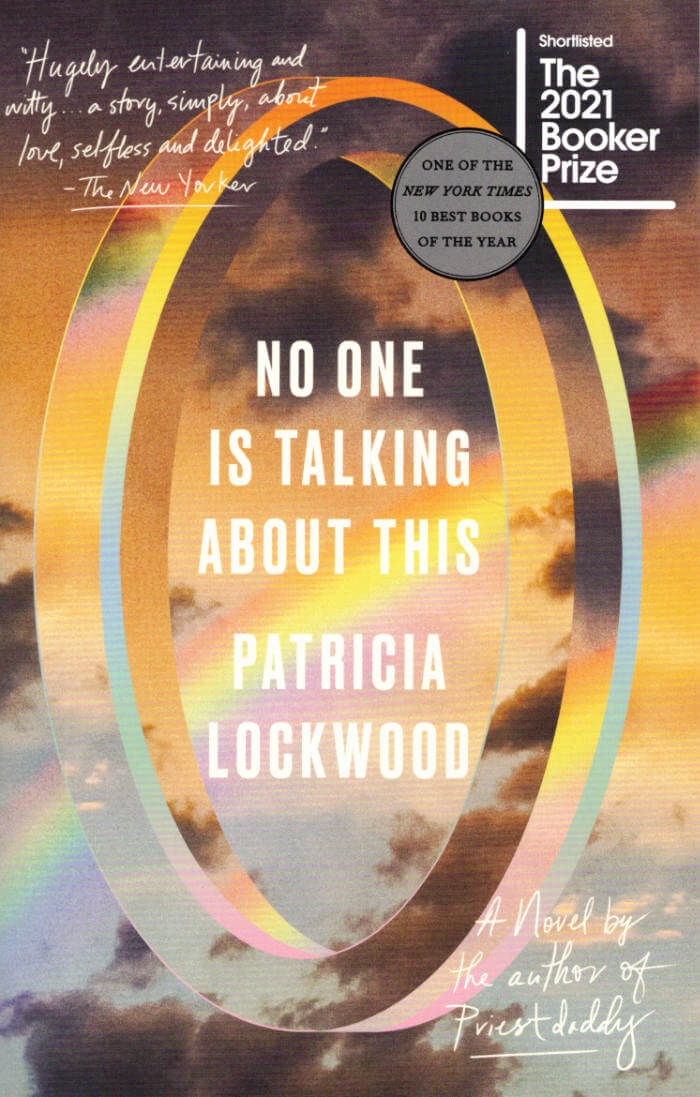
No One Is Talking about This
As this urgent, genre-defying book opens, a woman who has recently been elevated to prominence for her social media posts travels around the world to meet her adoring fans. She is overwhelmed by navigating the new language and etiquette of what she terms the portal, where she grapples with an unshakable conviction that a vast chorus of voices is now dictating her thoughts.
When existential threats—from climate change and economic precariousness to the rise of an unnamed dictator and an epidemic of loneliness—begin to loom, she posts her way deeper into the portal's void. An avalanche of images, details, and references accumulate to form a landscape that is post-sense, post-irony, post-everything. Are we in hell? the people of the portal ask themselves. Are we all just going to keep doing this until we die? Suddenly, two texts from her mother pierce the fray: Something has gone wrong, and How soon can you get here? As real life and its stakes collide with the increasingly absurd antics of the portal, the woman confronts a world that seems to contain both an abundance of proof that there is goodness, empathy, and justice in the universe, and a deluge of evidence to the contrary.
Fragmentary and omniscient, incisive and sincere, No One Is Talking About This is at once a love letter to the endless scroll and a profound, modern meditation on love, language, and human connection from a singular voice in American literature.

I'll Drown My Book: Conceptual Writing by Women
Vanessa Place, Teresa Carmody and 2 more
Conceptual writing is emerging as a vital 21st century literary movement and I’ll Drown My Book represents the contributions of women in this defining moment. Edited by Caroline Bergvall, Laynie Browne, Teresa Carmody and Vanessa Place, I’ll Drown My Book takes its name from a poem by Bernadette Mayer, appropriating Shakespeare. The book includes work by 64 women from 10 countries, with contributors’ responses to the question—What is conceptual writing?—appearing alongside their work. I’ll Drown My Book offers feminist perspectives within this literary phenomenon.
CONTRIBUTORS:
Kathy Acker, Oana Avasilichioaei & Erin Moure, Dodie Bellamy, Lee Ann Brown, Angela Carr, Monica de la Torre, Danielle Dutton, Renee Gladman, Jen Hofer, Bernadette Mayer, Sharon Mesmer, Laura Mullen, Harryette Mullen, Deborah Richards, Juliana Spahr, Cecilia Vicuña, Wendy Walker, Jen Bervin, Inger Christiansen, Marcella Durand, Katie Degentesh, Nada Gordon, Jennifer Karmin, Mette Moestrup, Yedda Morrison, Anne Portugal, Joan Retallack, Cia Rinne, Giovanni Singleton, Anne Tardos, Hannah Weiner, Christine Wertheim, Norma Cole, Debra Di Blasi, Stacy Doris & Lisa Robertson, Sarah Dowling, Bhanu Kapil, Rachel Levitsky, Laura Moriarty, Redell Olsen, Chus Pato, Julie Patton, Kristin Prevallet, a.rawlings, Ryoko Seikiguchi, Susan M. Schultz, Rosmarie Waldrop, Renee Angle, Rachel Blau DuPlessis, Theresa Hak Kyung Cha, Tina Darragh, Judith Goldman, Susan Howe, Maryrose Larkin, Tracie Morris, Sawako Nakayasu, M. NourbeSe Philip, Jena Osman, kathryn l. pringle, Frances Richard, Kim Rosenfeld, and Rachel Zolf.

Cunt Norton
In Cunt Norton, the sequel to her unforgettable CUNT UPS, Dodie Bellamy "cunts" The Norton Anthology of Poetry (1975 edition), setting her text-ravenous cut-ups loose to devour the canonical voices of English literature.
The texts that emerge from this sexual-linguistic encounter are monstrous, beautiful, unashamed: 33 erotic love poems ("the greatest fuck poem in the English language," according to Ariana Reines) that lust after the very aesthetic they resist. "These patriarchal voices that threatened to erase me—of course I love them as well," Bellamy writes. Even as Cunt Norton dismembers the history of English poetry, "cunting" Chaucer and Shakespeare, Emerson and Lowell, it simultaneously allows new sexual members to arise and fill in the gaps, transforming the secret into the explicit, the classically beautiful into the wonderfully grotesque. Bellamy's cunted texts breathe life into literary "masters" with joy, honesty, hilarity, and insatiable passion.
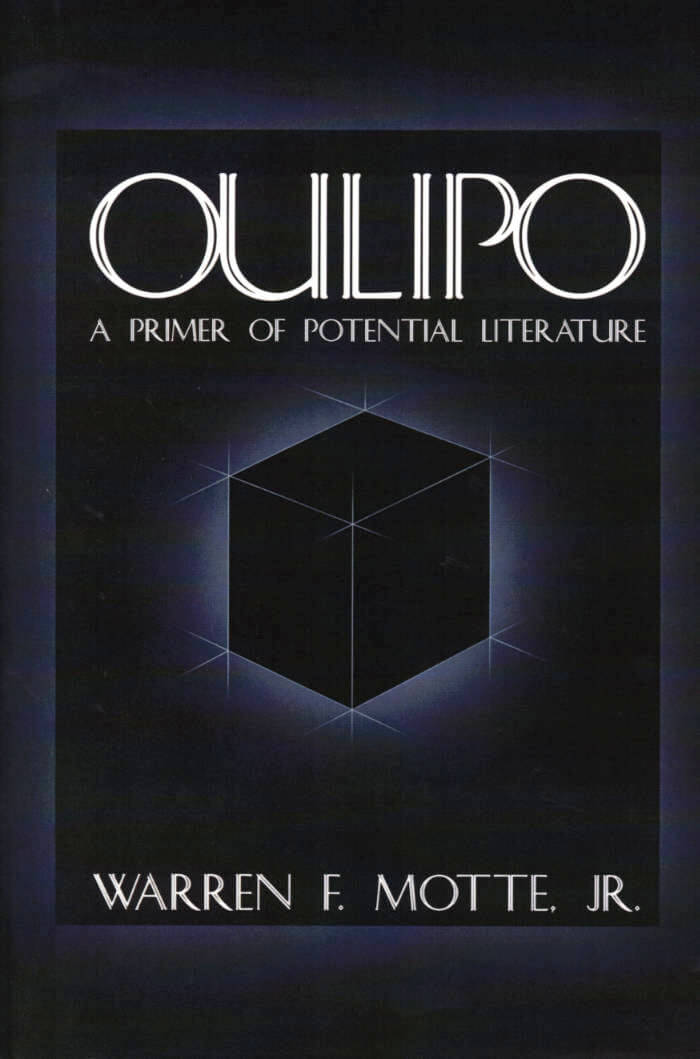
Oulipo: A Primer of Potential Literature
A collection of writings by members of the group known as the Oulipo (OUvroir de LItterature POtentiale), this anthology includes, among others, Italo Calvino, Harry Mathews, Georges Perec, Jacques Roubaud, and Raymond Queneau. Founded in Paris in 1960, the Oulipo views imaginative writing as an exercise dominated by the method of "constraints."

One Thing I Know
One Thing I Know is Pati Hill's third novel, first published in 1962, when she was forty-one and had just given birth to her first and only child. It is the last novel she wrote before claiming to "quit writing in favor of housekeeping".
Written in the purest tradition of American coming-of-age stories, One Thing I Know follows a sixteen-year-old girl, Francesca Hollins, as she discovers an unexpected taste for autonomy. The bravado of her affirmation cannot mask the seriousness of her conviction: "One thing I know, I will never be in love again." Francesca's journal begins with this statement, and neither Danny, a young boyfriend already haunted by bourgeois dreams, nor her mother, a woman she believes lacks all imagination, can convince her otherwise. The novel recounts how Francesca discovers an unexpected definition of her independence, something Diane Arbus perceived when she wrote to Hill: "I am more than ever convinced and maybe [Francesca] is too, that people are born old and that life has to be lived backwards and there is no convenient shortcut like forwards."

Fake Accounts
On the eve of Donald Trump's inauguration, a young woman snoops through her boyfriend's phone and makes a startling discovery: he's an anonymous internet conspiracy theorist, and a popular one at that. Already fluent in internet fakery, irony, and outrage, she's not exactly shocked by the revelation.
Actually, she's relieved-he was always a little distant-and she plots to end their floundering relationship while on a trip to the Women's March in D.C. But the uncovering of his double life is only the first in a series of bizarre twists that expose a world whose truths are shaped by online lies. Suddenly left with no reason to stay in New York-or to be anywhere in particular-our unnamed narrator flees to Berlin, embarking on her own cycles of manipulation in the deceptive spaces of her daily life, from dating apps to expat meetups, open-plan offices to bureaucratic waiting rooms

Reader
Reader is the first anthology to gather Constance DeJong’s diverse body of writing. Spanning from the 1980s to the present, the publication features eighteen works by DeJong, including out-of-print and previously unpublished fiction, as well as texts emanating from her new media sculptures, sound works, video works, and public art commissions.
An influential figure of the 1970s and ’80s downtown New York writing and performance scene, Constance DeJong has channeled time and language as mediums in her work for the last four decades, expanding the possibilities of narrative form and literary genre. From the earliest work collected here—a manuscript of DeJong’s 1982 prose text I.T.I.L.O.E.—to the digital project Nightwriters (2017-18), Reader assembles a range of experimental texts by the artist. The volume includes such works as the 2013 publication and performance, SpeakChamber and the script for Relatives (1988), a duet between a television and a performer made in collaboration with artist Tony Oursler. Never-before-published works including texts created for re-engineered vintage radios, aphorisms commissioned for a Times Square digital billboard, and transcripts for sound works originally installed along the Thames and Hudson rivers are also featured in the book.
Taken together, these works showcase how DeJong has helped define and push the boundaries of language in the visual and performing arts. The artist’s sustained exploration of language blurs the lines between many fields, and DeJong’s work has also had a long life in the literary world. In the late 1970s, she self-published the critically acclaimed novel Modern Love on her short-lived Standard Editions imprint. On the 40th anniversary of the novel’s original publication, the book was published in facsimile form by Primary Information and Ugly Duckling Presse, and has gone on to sell over 10,000 copies since its release in 2017.
Constance DeJong is a New York-based artist who has exhibited and performed internationally. Her work has been presented at the Renaissance Society, Chicago; the Walker Art Center, Minneapolis; the Wexner Center for the Arts, Columbus; the Philadelphia Museum of Art; and in New York at the Dia Art Foundation; The Kitchen, Thread Waxing Space, and the Whitney Museum of American Art. In 1983 she composed the libretto for Satyagraha, the Philip Glass opera, which has been staged at opera houses worldwide, including the Metropolitan Opera, New York; the Netherlands National Opera, Rotterdam; and the Brooklyn Academy of Music, New York. She has permanent audio-text installations in Beacon, New York; London; and Seattle. DeJong has published several books of fiction, including her celebrated Modern Love (Standard Editions, 1977; Primary Information/Ugly Duckling Presse, 2017), I.T.I.L.O.E. (Top Stories, 1983), and SpeakChamber (Bureau, 2013), and her work is included in the anthologies Up is Up, But So is Down: New York’s Downtown Literary Science, 1974-1991 (NYU Press, 2006); Blasted Allegories (New Museum/MIT, 1987), and Wild History (Tanam Press, 1985).
—
Editor: Rachel Valinsky
Designer: Freer Studio
Copy editor: Allison Dubinsky

Diego Garcia
Natasha Soobramanien, Luke Williams
Edinburgh, 2014. Two writer friends, Damaris and Oliver Pablo, escape London, the city that killed his brother. They spend their days trying to get to the library, bickering over their tanking bitcoin, failing to write or resist the sadness. Then they meet Diego, a poet. He tells them he is named for his mother’s island in the Chagos Archipelago, which she and her community were forced to leave by British soldiers in 1973. Damaris and Oliver Pablo become obsessed with this notorious episode and the continuing resistance of the Chagossian people, and want to write in solidarity. But how to share a story that is not theirs to tell? And how to account for a loss not theirs to grieve? A tragicomedy interrogating the powers of literature alongside the crimes of the British government, Diego Garcia is a collaborative fiction that opens up possibilities for the novel and seeks other ways of living together.
‘Intimate yet expansive, heartbroken but unbowed, and a book about writing that is anything but solipsistic, it’s a stirring novel that lights a way forward for politically conscious fiction.’
— Anthony Cummins, Observer
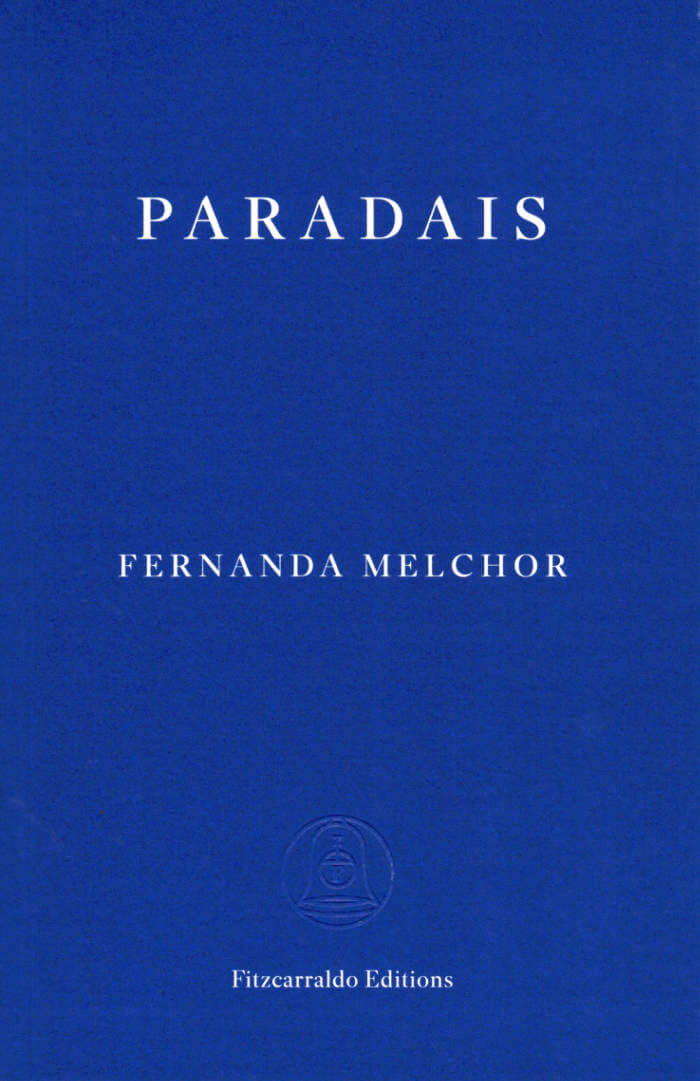
Paradais
Inside a luxury housing complex, two misfit teenagers sneak around and get drunk. Franco Andrade, lonely, overweight, and addicted to porn, obsessively fantasizes about seducing his neighbour – an attractive married woman and mother – while Polo dreams about quitting his gruelling job as a gardener within the gated community and fleeing his overbearing mother and their narco-controlled village. Each facing the impossibility of getting what he thinks he deserves, Franco and Polo hatch a mindless and macabre scheme. Written in a chilling torrent of prose by one of our most thrilling new writers, Paradais explores the explosive fragility of Mexican society – fractured by issues of race, class and violence – and how the myths, desires, and hardships of teenagers can tear life apart at the seams.
‘With a nimble command of the novel’s technical resources and an uncanny grasp of the irrational forces at work in society, the books navigate a reality riven by violence, race, class, and sex. And they establish Melchor, who was born in 1982, as the latest of Faulkner’s Latin American inheritors, and among the most formidable.... In Melchor’s world, there’s no resisting the violence, much less hating it. All a novelist can do, she seems to suggest, is take a long, unsparing look at the hell that we’ve made.’
— Juan Gabriel Vázquez, New Yorker
Translated by Sophie Hughes.
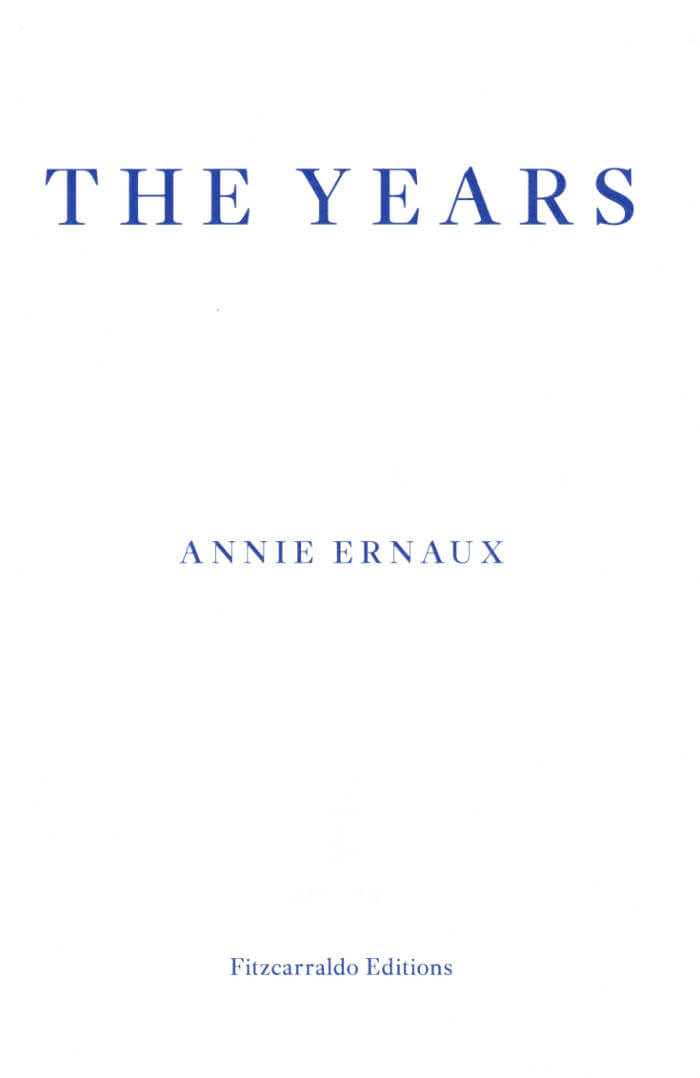
The Years
Considered by many to be the iconic French memoirist’s defining work, The Years is a narrative of the period 1941 to 2006 told through the lens of memory, impressions past and present, cultural habits, language, photos, books, songs, radio, television, advertising and news headlines. Annie Ernaux invents a form that is subjective and impersonal, private and communal, and a new genre – the collective autobiography – in order to capture the passing of time. At the confluence of autofiction and sociology, The Years is ‘a Remembrance of Things Past for our age of media domination and consumerism’ (New York Times), a monumental account of twentieth-century French history as refracted through the life of one woman.
Translated by Alison L. Strayer.

Amor Cringe
Amor Cringe explores the dually base and beautiful aspects of self-obsessed media culture. In a perennial bohemian style, an unnamed, ungendered protagonist travels from coast to coast and affair to affair, stumbling upon various moments of failure, absurd insight, and flashes of transcendence.
Half traditionally-written and half AI-generated, Amor Cringe is a "deepfake autofiction" novelette about a TikTok influencer that seeks God, created with the intention to be "as cringe as possible." The result is a painfully self-aware series of encounters that exfoliate the repulsive and fascinating aesthetics of romantic life under social media.
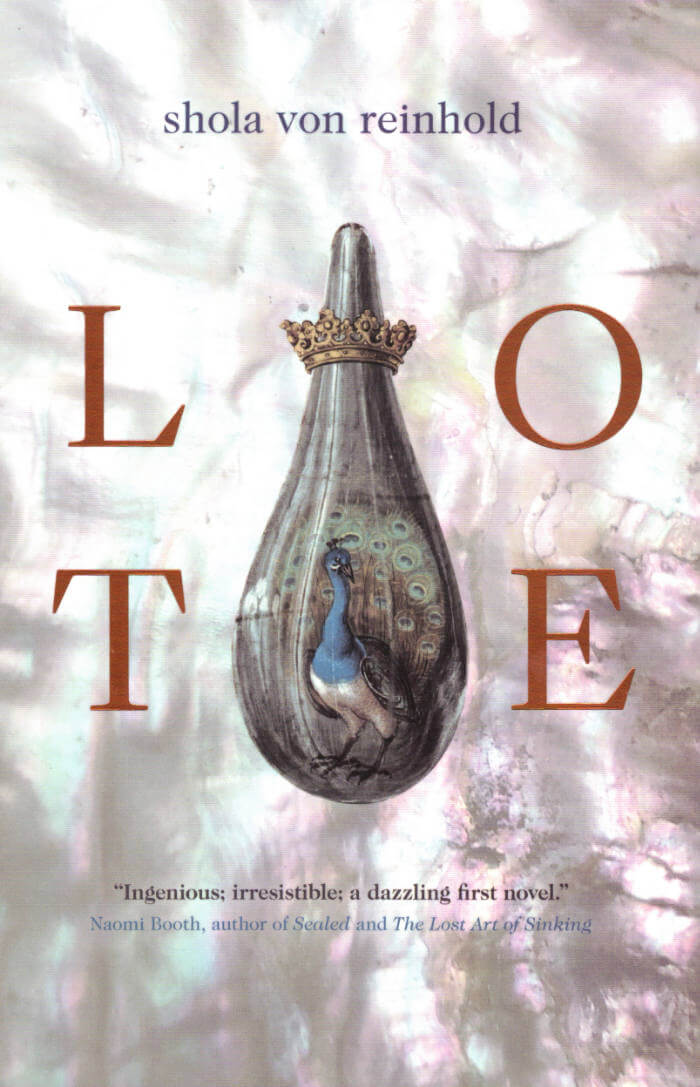
Lote
Shola von Reinhold's decadent queer literary debut immerses readers in the pursuit of aesthetics and beauty, while interrogating the removal and obscuring of Black figures from history.
Solitary Mathilda has long harbored a conflicted enchantment bordering on rapture with the "Bright Young Things," the Bloomsbury Group, and their contemporaries of the '20s and '30s, and throughout her life her attempts at reinvention have mirrored their extravagance and artfulness. After discovering a photograph of the forgotten Black modernist poet Hermia Druitt, who ran in the same circles as the Bright Young Things, Mathilda becomes transfixed and resolves to learn as much as she can about the mysterious figure. Her search brings her to a peculiar artists' residency in Dun, a small European town in which Hermia was known to have lived during the '30s. The artists' residency throws her deeper into a lattice of secrets and secret societies that takes hold of her aesthetic imagination. From champagne theft and Black Modernisms to art sabotage, alchemy, and a lotus-eating proto-luxury communist cult, Mathilda's "Escapes" through modes of aesthetic expression lead her to question the convoluted ways truth is made and obscured.
Shola von Reinhold is a Scottish socialite and writer. Shola has been published in the Cambridge Literary Review, The Stockholm Review, was Cove Park's Scottish Emerging Writer 2018 and recently won a Dewar Award for Literature. Shola is a recent graduate from the Creative Writing MLitt at Glasgow which was completed through the Jessica Yorke Writing Scholarship and has previously studied Fine Art at Central Saint Martins. Shola has also written for publications including i-D, AnOther Magazine.
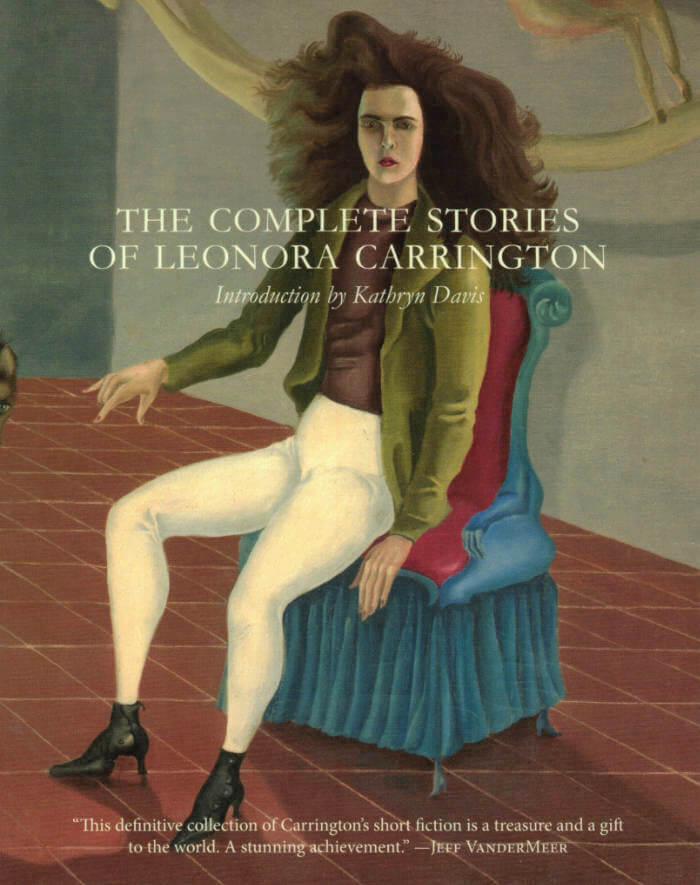
The complete stories of Leonora Carrington
Surrealist writer and painter Leonora Carrington (1917-2011) was a master of the macabre, of gorgeous tableaus, biting satire, roguish comedy, and brilliant, effortless flights of the imagination. Nowhere are these qualities more ingeniously brought together than in the works of short fiction she wrote throughout her life.
Published to coincide with the centennial of her birth, THE COMPLETE STORIES OF LEONORA CARRINGTON collects for the first time all of her stories, including several never before seen in print. With a startling range of styles, subjects, and even languages (several of the stories are translated from French or Spanish), THE COMPLETE STORIES captures the genius and irrepressible spirit of an amazing artist's life.

Sun of an Ignored Putrid Productivity
Bárbara Acevedo Strange, Eva Tatjana Stürmer
Sun of an Ignored Putrid Productivity is a speculative novel about the influence of artificial intelligence and accelerating technological progress on our human interactions. The dialogical script is based on personal reflections and pop-cultural, scientific and philosophical references from the beginnings of cybernetics to more recent voices. Randomly generated, constructed and quoted contents cannot be distinguished from each other. The borderline between fact and fiction becomes blurred. What is left is a flickering effect, disorientation, which reflects our perception of reality under conditions of never-ending information overflow.

Yes, I Am A Destroyer
I travel far across the city, cut it knowingly, concealing behind me the entrances to tunnels, altering the signage. I traverse the grimiest bowels, skirt the farthest wettest edges like a silverfish active only in the hallucinatory hours, to avoid becoming known, to avoid any collusion between my body and theirs, its.
Under the neon sky of a sick city, which might be London, a nameless governess oscillates between lucidity and dissociation, solitude and communication, wage labour and escape attempts. A wild and unreliable narrator-without-character—ardent, delirious, complicit, vengeful, and paranoid—she embodies a perverse and chaotic resistance. Simultaneously demonic and angelic, both maniacal and generous in her fury, accidentally elegant, tongue tied and barbed, she veers towards defiance as devotion. An anti-Bildungsroman in the collapsing first person, Yes, I Am A Destroyer is an unbecoming record of memory and forgetting, of a relentless undoing.
‘Any girl who learns how to read is already a lost girl, wrote the infamous confessionalist Rousseau. But if that lost girl, with insatiable pronoun, bastard spawn perhaps of the exiled Genevan, palmed a pen and confessed—how would that read? What can she know? With relentless intelligence and urgent prosody, Mira Mattar shows us. She invents a narrator in the raging anti-tradition of Violette Leduc and Albertine Sarrazin, leaps beyond the cloying contract of capital with the feminine, of intimacy with violence, to animate a lush document of the refusal of subjection. Much like the young Jean-Jacques, she’s a tutor underpaid for her sensitivity. She is, like him, a thief of small things, a sponge for the edifying comportments of the employing class. What she makes of her servitude—a fabulously grotesque encyclopedia of sensing—is dedicated to female anger. Scrubbing, washing, chewing, frigging, barfing, stealing, moisturising, shitting: every surface, every gesture, is appropriated to her bodily resistance. ‘Live anyway’ is her stoic motto. This glorious tract ends with a call for the anarchical vigour of the animal body we share. Read it and flourish. You will perhaps be invoiced.’
–> Lisa Robertson
Mira Mattar writes fiction and poetry. She is an independent researcher, editor, and tutor. A Palestinian/Jordanian born in the suburbs of London, she continues to live and work there. She has read and published her work widely. Yes, I Am A Destroyer is her first book.
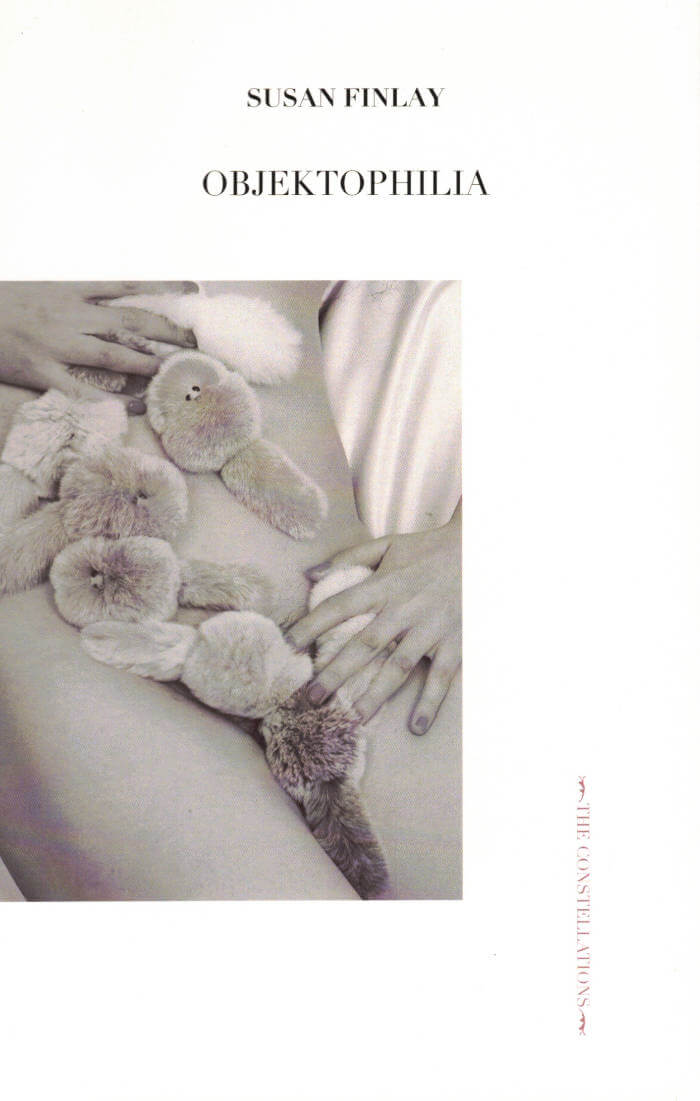
Objectophilia
Design classics, the dates of which ranged from the beginnings of the previous century to the start of the current one, were scattered throughout the room, their very definite shapes offset against the off-white, off-modern walls. I allowed my gaze to flit from one piece of furniture to the next, and as I mentally joined the dots between them I unwittingly re-wrote their history according to thematic as opposed to chronological concerns. I wondered if perhaps I were simply seeing my own flat ‘in the expanded field’, each element repositioned by some new and typically rabid curator eager to facilitate the production of their own dense texts...
Part metafiction, part design criticism, with a touch of armchair psychoanalysis, Objektophiliabegins in London in 2014, where a nameless design critic and her partner X reside in a decrepit but Grade II listed tower block. It ends some months later among the fin de siècle wonders of Vienna in an echo of the successive encounters of Schnitzler’s La Ronde. Possessed by the ruins of social housing and its accompanying ideologies, but nonetheless in possession of those ruins’ original brushed-steel light-fittings, the critic soon discovers that her craving for these and similarly ‘undemanding things’ has usurped her more conventional—or fleshly—desires.
‘Susan Finlay’s deft, subtle work examines the psychic texture of life through our relation to things... objects of all kinds, from Filet-O-Fish sandwiches to high art, Le Creuset cookware, bicycle baskets and purpose-built, modern flats. Objektophiliais witty and brisk and devastating all at the same time.’
–> Chris Kraus
Susan Finlay is a writer and artist. She is the author of three poetry pamphets: Indole, 2019, The Unruly Glove, the Green Bum and the Sickly Trickle(2018), and Sex and the City 2 (2017), and two previous novels: Our Lady of Everything(Serpent’s Tail, 2019), and Arriviste (Five Lines in the Sand, 2007). Most (but not all) of her work relates to psychoanalysis, magic, and the decorative arts. She lives in the UK and Berlin.
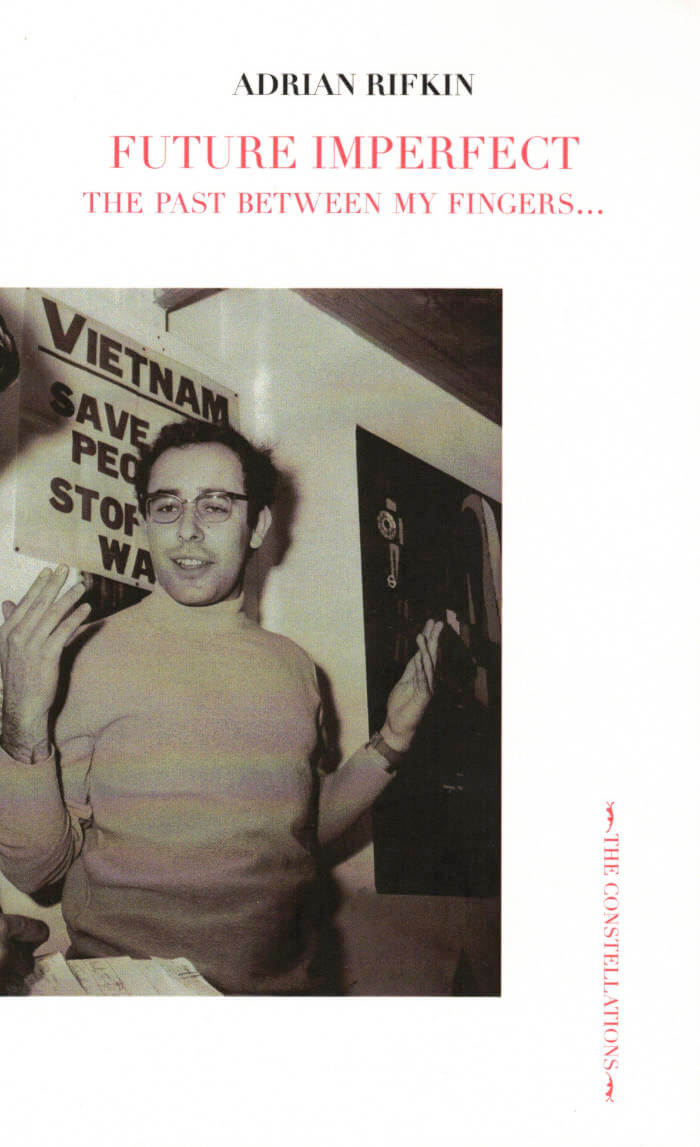
Future Imperfect
Then let the story really begin in 1968, though it has little to do with May. By chance it opens in January of that year, and it really concerns me rather than the world of political events, though these are always on my mind, as they were always on my mind. Its antecedents are in the summer of 1967, when I lived, happily, in a squalid bedsit in the then squalid Ladbroke Square, as well as in some basement maid’s room in the West End, and did my secondary sources in the British Library, the V&A, and also, a bit, in Paris, Bordeaux, and Montauban, though that was to flirt with the primary sources ahead of time.
This short Bildungsroman sets beside each other the fault lines of events and moments recalled without a diary with the verification and sometimes undermining effects of new research of materials, the recovery of what was known, what might have been known, and what was merely probable, as if this were a history of the history of art.
‘This is an extraordinary journey. Using ekphrasis as method—and as a proper timeline for an indefinite confinement—it wanders through a lived calendar of scholarship, where forgotten stories of art history books flirt with library indexes and archival catalogues, and streetwalking meets gay longing at the heart of the text.’
– Élisabeth Lebovici
Adrian Rifkin worked in art departments as a historian and a studio tutor, in historical and cultural studies as well as visual culture, from Portsmouth Polytechnic in 1970 to Goldsmiths, University of London in 2012, where he was a professor of Art Writing. A collection of essays, Communards and Other Cultural Histories, edited and introduced by Steve Edwards, was published in 2017. Interdisciplinary Encounters, Hidden and Visible Explorations of the Work of Adrian Rifkin, edited by Dana Arnold, appeared in 2015.

Unable To Achieve Broad Recognition In My Lifetime, I Laboured In Obscurity Until My Death Last Year
For nearly two years the author collected phrases from the exhibition press releases she received through email, posting certain of them on Facebook in a rather unsystematic way (that is to say, when she felt like it), with only one change, that of the personal pronoun, so each statement appeared vainglorious, absurd, even tragic. She supposes the measure was if they made her laugh or gasp or used words she deplores when thinking or writing about art. The posts gathered quite a following. Some people still mention them to her, and others have asked her to look at their own press releases before circulation.
These extracts have provoked laughter, disbelief (especially when performed as public readings, when she has been obliged to swear to their veracity), self-recognition, and yes, shame.
She had only three rules: 1) She would not quote the press release of anyone she knows (certainly she could have done—she must admit that both a friend and someone she dislikes intensely have slipped in, and she fervently hopes neither ever reads this book); 2) She would not alter anything except the pronoun (this is largely true; however, for this book, she corrected some errors of punctuation and spelling, changed spellings to their English form, and employed her beloved Oxford comma); and 3) She would not use anything the artist had written (this, too, is true, save for one exception that was too wonderful not to include).
Finally, she gathered a collection of endorsements, some along the way, others when she indicated this work was done. She is still alive and she continues to labour in obscurity.
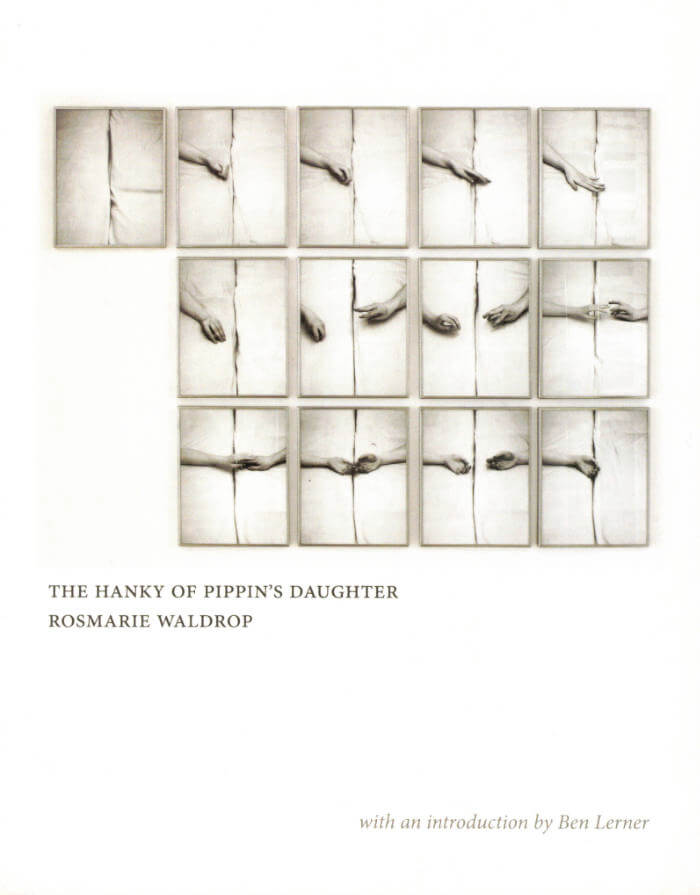
The Hanky of Pippin's Daughter
Poet Rosmarie Waldrop’s classic novel about the horrors and banalities of German life between the World Wars.
“Josef and Frederika Seifert made a bad marriage—he so metaphysical, she, furious frustrated singer, furious frustrated femme fatale, unfaithful within two months of the wedding day. The setting is small town Germany between the wars; the Seiferts are just those ‘ordinary people’ who helped Hitler rise, bequeathing their daughter, who tells their story, a legacy of grief and guilt. Rosmarie Waldrop’s haunting novel, superbly intelligent, evocative and strange, reverberates in the memory for a long time, a song for the dead, a judgment.” (Angela Carter)

Indivisible
The conclusion of a radically philosophical and personal series of Fanny Howe novels animated by questions of race, spirituality, childhood, transience, resistance, and poverty.
First published by Semiotexte in 2001, Indivisible concludes a radically philosophical and personal series of Fanny Howe novels animated by questions of race, spirituality, childhood, transience, wonder, resistance, and poverty. Depicting the tempestuous multiracial world of artists and activists who lived in working-class Boston during the 1960s, Indivisible begins when its narrator, Henny, locks her husband in a closet so that she might better discuss things with God. On the verge of a religious conversion, Henny attempts to make peace with the dead by telling their stories.

The Jacques Lacan Foundation
It’s fall (or autumn) 2018. The Trump administration wants to fortify the United States-Mexico border, Robert ‘Beto’ O'Rourke is running for Senate, and British grifter Nicki Smith has just secured a “low-paid glamour job” at the University of Texas’ Jacques Lacan Foundation. In between sleeping with the air-conditioning repair guy (or man) and watching Kate Moss make-up commercials (or advertisements) Nicki completes the first ever American-English translation of Lacan’s newly discovered and highly controversial notebook – without knowing any French.
An Anglo-American comedy of manners about identity and class The Jacques Lacan Foundation reveals—and revels in—the numerous pretensions that surround academia and authorship, and the institutions that foster them.